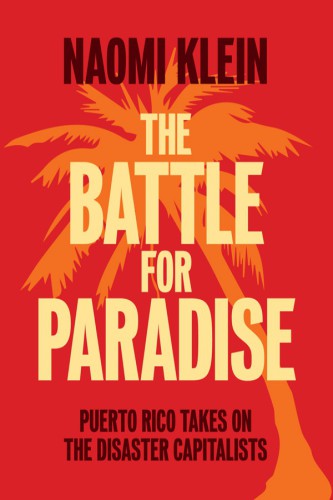
The Battle for Paradise
Puerto Rico Takes on the Disaster Capitalists
کتاب های مرتبط
- اطلاعات
- نقد و بررسی
- دیدگاه کاربران
نقد و بررسی

Activist and journalist Klein (No Is Not Enough: Resisting Trump's Shock Politics and Winning the World We Need, 2017, etc.) looks at the "shock doctrine" as it is now unfolding in the ruins of Puerto Rico.There's a method to the apparent madness that, more than half a year after the devastation of hurricanes Irma and Maria, keeps much of Puerto Rico without electricity and drinking water. By the author's account in this brief cri de coeur, it affords an opportunity for a clearance sale and land boom, which explains why the "disaster capitalists who have descended on Puerto Rico are reinforcing the most traumatizing part of the disaster they are there to exploit: the sense of helplessness." Helplessness is the keyword for cities and their chokepoints, dependent on sea traffic from Florida to bring in supplies, unable to rely on agribusiness for fresh produce, and unable to air condition or light buildings. What to do? Sell out cheap and move to America, turning Puerto Rico into a place for natives to visit even as the speculators are moving to turn San Juan into the next Miami, helped along by a governor who seems committed to the project of luring American corporations to the island with a 4 percent corporate tax rate, "a fraction of what corporations pay even after Donald Trump's recent tax cut." It all seems to be working, except that, as Klein notes, plenty of Puerto Ricans are demonstrating that there can be another course, one in which the island is remade with small farms and gardens, renewable power, decentralized government, and other instruments of economic, small-is-beautiful revolution. As the author tours the island, she contrasts the desolation of the cities with the relative prosperity of communities that have adopted these soft-path, anti-colonialist strategies. Which will prevail? "Both are gaining power fast," writes Klein in conclusion, "and in the high-stakes months and years to come, collision is inevitable."A revealing, on-the-ground report that ably shows that the real looters after disaster are not the poor.
COPYRIGHT(2018) Kirkus Reviews, ALL RIGHTS RESERVED. (Online Review)

June 18, 2018
Journalist Klein (No Is Not Enough) lays out the challenges facing Puerto Ricans who seek to transform their island into a democratic polity that serves the people’s interests rather than colonial kleptocracy in what is essentially an extended if enlightening pamphlet. The brief work reports on the actions taken after Hurricane Maria by Professors Self-Assembled in Solidarity Resistance and other organizations to develop strategies for combating neoliberal structural adjustments such as privatization of public services and deregulation of commerce, as well as the wealthy “Puertopians” investing in an attempt to use the island for cryptocurrency mining (surprising given the lack of adequate power for those who live there). Klein recapitulates elements of her work regarding the “shock doctrine,” noting privatizations of public assets in the wake of the hurricane, which worsened previously imposed austerity measures. She breaks Puerto Rico’s circumstances down into four categories—desperation, distraction, despair, and disappearance—and traces the problems to corruption, incompetence, and years of neglect, combined with a “starve-then-sell strategy” that has furthered privatization schemes elsewhere. But Klein finds sources of hope in centers of community-run resistance, such as the JunteGente network (to which she is donating royalties from the book), a network of organizers against austerity and inequality. Klein’s account is a welcome update on the situation in Puerto Rico—one that portends similar battles worldwide as climate change accelerates.

























دیدگاه کاربران